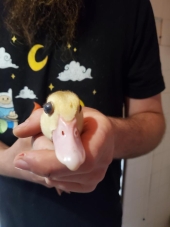
 6
6




Striving to grow things as naturally, simply, and cheaply as possible! 
My YouTube channel
 8
8





 1
1






Striving to grow things as naturally, simply, and cheaply as possible! 
My YouTube channel
 8
8








Eric Hammond wrote:Its definitely a lack of fish problem. I dug a pond going on 3 years ago now. Its had ducks from the beginning. Its been fun watching it go through evolution. Frogs were the first to arrive. Last year it got overrun with snails and leeches! We only noticed because tadpoles were dying at an alarming rate and after investigating the tadpoles were covered with leeches. Thousands of them were dying. I guess they come in on bird feet and start reproducing. I put 25 red ear perch and 25 hybrid blue gill along with 2 lbs of fat head minnows in the pond and all the leeches are gone, some snails are there but much more controlled. I did not give the fish any habitat because I could not justifying putting anything into this hole I paid to have material taken out of lol!
Strong communities make police obsolete.







A human being should be able to change a diaper, plan an invasion, butcher a hog, conn a ship, design a building, write a sonnet, balance accounts, build a wall, set a bone, comfort the dying, take orders, give orders, cooperate, act alone, solve equations, analyze a new problem, pitch manure, program a computer, cook a tasty meal, fight efficiently, die gallantly. Specialization is for insects.
-Robert A. Heinlein
 7
7




D.W. Stratton wrote:
What about the permaculture ethic of fair share and all life being valuable? Don't we have an obligation to these little guys as creatures who manipulate other species so readily? I am distressed frequently by the extent to which we view only the yield as this does not seem to be in keeping with sustainability.
"The rule of no realm is mine. But all worthy things that are in peril as the world now stands, these are my care. And for my part, I shall not wholly fail in my task if anything that passes through this night can still grow fairer or bear fruit and flower again in days to come. For I too am a steward. Did you not know?" Gandolf
 6
6




"When the whole world is running towards a cliff, he who is running in the opposite direction appears to have lost his mind." C.S. Lewis
Visit https://themaineingredient.com for organic, premium dried culinary herbs that are grown, processed, and packaged in the USA.
 8
8




Matt McSpadden wrote:While I hate to resurrect old posts....
"I live on Earth at present, and I don't know what I am.I know that I am not a category.I am not a thing—a noun.I seem to be a verb, an evolutionary process—an integral function of the universe."
Buckminster Fuller
 2
2




John Daley Bendigo, Australia The Enemy of progress is the hope of a perfect plan
Benefits of rainfall collection https://permies.com/t/88043/benefits-rainfall-collection
GOOD DEBT/ BAD DEBT https://permies.com/t/179218/mortgages-good-debt-bad-debt
 4
4




Rachel Rudd
 2
2




"MacGyve"








Amy Arnett wrote:That's too bad your lake is getting full of leeches. While I don't have experience with aquatic leeches, we have "mountain leeches" (yamabiru) which are super annoying and everywhere. I had no idea that leeches existed out of water!
 4
4




Matt McSpadden wrote:Every year inside the designated swim area we would take rakes and rake out all the muck and leaves and pine needles that had fallen since the previous year.




John Daley Bendigo, Australia The Enemy of progress is the hope of a perfect plan
Benefits of rainfall collection https://permies.com/t/88043/benefits-rainfall-collection
GOOD DEBT/ BAD DEBT https://permies.com/t/179218/mortgages-good-debt-bad-debt

|
Holly was looking awful sad. I gave her this tiny ad to cheer her up!
Homestead Pigs Course
https://permies.com/wiki/365748/Homestead-Pigs
|






